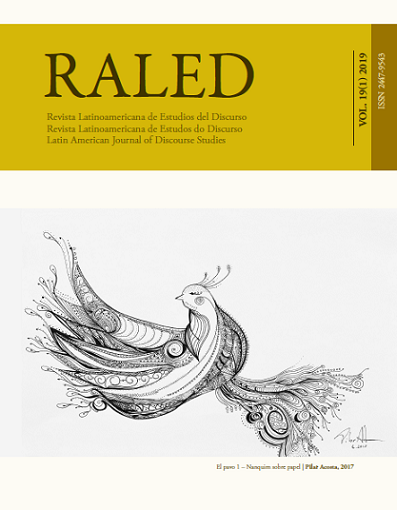Discourse construction of the status of sage in the narratives of two mapuche-pehuenche kimches
DOI:
https://doi.org/10.35956/v.19.n1.2019.p.75-97Keywords:
kimche. ancestral knowledge. disocurse practices. ideational system. mapuche cosmovision.Abstract
This article aims to account for the construction of the status of sage in the narratives of two Ma-puche-Pehuenche kimches, who play a fundamental social role in the maintenance of mapuche traditions and culture in the Alto Bío-Bío communities. Through a qualitative-descriptive study that examines the oral testimonies of two kimches, sequences of recurrent activities that conform the formative discourse of the sage in ancestral cultures are described and explained regarding their role in the construction of the status of the sage. The results of the discursive-linguistic analysis of the stories show that the kimche status in primary societies is marked by experiences based on the collective. This means that the status of kimche is closely linked to activities that favour the community. These experiences impose on the kimches the responsibility to assume leadership roles, through their active participation in rituals, in assemblies and in rescue actions and preservation of their traditions.
Downloads
References
Aigo, J., & Ladio, A. 2016. Traditional mapuche ecological knowledge in Patagonia, Argentina: fishes and other living beings inhabiting continental waters, as a reflection of processes of change. Journal of Ethnobiology and Ethnomedicine 12(56): 1-17.
Becerra, S., Merino, M. E., Webb, A. & Larrañaga, D. 2018. Recreated Practices by mapuche Women that Strenghten Place Identity in New Urban Spaces of Residence in Santiago, Chile. Ethnic and Racial Studies 41(7): 1255-1276.
Denzin, N. & Lincoln, Y. 2005. Introduction. The Discipline and Practice of Qualitative Research. En N. Denzin y W. Lincoln (Eds.). The Sage Handbook of Qualitative Research. Third Edi-tion, pp. 1-32. Thousand Oaks: Sage Publications, Inc.
Denzin, N. & Lincoln, Y. 2012. Manual de investigación cualitativa vol. 2: Paradigmas y perspectivas en disputa. Mexico: Gedisa.
Fairclough, N. 2003. Analysing Discourse. Textual Analysis for Social Research. London: Routledge.
Foucault, M. 1972/2010. The Archeology of Knowledge. New York: Vintage.Gay, C. 2018. Usos y Costumbres del Pueblo Araucano. (trad. Milos, D). Santiago: Taurus. Goody, J. & Wat t, I. 1968. The Consequences of Literacy. En J. Goody (Ed.). Literacy in Traditional Societies, pp. 27-68. Cambridge: Cambridge University Press.
Guevara, T. 1913. [Disponible en línea en http://www.memoriachilena.cl/602/w3-article-8187.html]. Las Últimas Familias y Costumbres Araucanas. Santiago: Barcelona [Consulta: 26 de enero de 2019].
Halliday, M. A. K. 1994. An Introduction to Functional Grammar. London, New York: Arnold.
Halliday M. A. K. & Matthiessen, C. 2014. An introduction to functional grammar (4th ed.). New York: Routledge.
Hao, J. 2015. [Disponible en línea en http://www.isfla.org/Systemics/Print/Theses.html]. Cons-truing biology: an ideational perspective. Ph.D. Dissertation, Department of Linguistics, Univer-sity of Sydney [Consulta: 15 de febrero de 2019].
Havelock, E. 1982. The Literate Revolution in Greece and Its Cultural Consequences. Princeton: Princeton University Press.
Hernández, G. 2013. Las Salamancas. Testimonios etnográficos, historia oral y memoria colecti-va. Anclajes 16(2): 17-31.
Latcham, R. 1928. [Disponible en línea en http://www.memoriachilena.cl/602/w3-article-8189.html]. La Organización Social y las Creencias Religiosas de los Antiguos Araucanos. Santiago: Cervan-tes [Consulta: 20 de septiembre de 2018].
MacLuhan, M. 1962/2011. The Gutenberg Galaxy: The génesis of the Homo Typographicus. Toronto: Toronto University Press.
Manquilef, M. 1910/2011. Comentarios del Pueblo Mapuche. Valdivia: Serindígena.
Martin J. R. 1992. English Text: System and Structure. Amsterdam, Philadelphia: John Benjamins.
Martin, J.R., & Rose, D. 2007. Working with discourse: meaning beyond the clause (2nd Ed). Lon-don, New York: Bloomsbury.
Martin J. R., & Rose D. 2008. Genre Relations. Mapping Culture. London: Equinox.
Martin, J. R. 2014. Evolving Systemic Functional Linguistics: Beyond the Clause. Functional Linguistics 1(3): 1-24.
Martínez-Sarasola, C. 2010. De Manera Sagrada y en Celebración: Identidad, Cosmovisión y Es-pritualidad en los Pueblos Indígenas. Buenos Aires: Biblos.
Mayorga-Muñoz, C., Pacheco-Cornejo, H. y Treggiari, F. 2017. El rol de la mujer indígena mapuche en la preservación de recursos genéticos y conocimientos tradicionales asociados. Un análisis jurídico desde la perspectiva de género. Revista Jurídicas 14(2): 29-45.
Montecino, S. 1984. Mujeres de la tierra. Santiago: CEM-PEMCI.
Ñanculef, J. 2016. Tayiñ Mapuche Kimün. Epistemología Mapuche. Sabiduría y Conocimiento. Santiago: Facultad de Ciencias Sociales. Universidad de Chile.Ong, W. 1982. Orality and Literacy. The Technologizing of the Word. London, New York: Routledge.
Peña-Cortés, F., Huilliñir-Curío, V., Pincheira-Ulbrich, J., Quintriqueo, S., Quilaqueo, S., Gutiérrez, M., & Morales, S. 2019. Mapuche-Pewenche knowledge transmitted by teachers and parents: perception of schoolchildren in rural schools of the Araucanía region (Chile). Journal of Multilingual and Multicultural Development 40(23): 244-256.
Quilaqueo, D. 2012. Saberes educativos mapuche: racionalidad apoyada en la memoria social de los kimches. Atenea 505: 70-102.
Quilaqueo, D. & Torres, H. 2013. Categorization of mapuche ways of conceiving time and space: Educational Knowledge of the Kimches. Diaspora, Indigenous and Minority Education 7(2): 84-98.
Roger, A. 1997/2013. Breve Tratado del Paisaje. Madrid: Biblioteca Nueva.
Skewes, J. 2016. Residencias en la cordillera. La lógica del habitar en los territorios mapuche del bosque templado lluvioso en Chile. Antípoda. Revista de Antropología y Arqueología 26: 133-154.
Thornborrow, J. 2012. Narrative analysis. En J. Gee & M. Handford (Eds.). The Routledge Han-dbook of Discourse Analysis, pp. 51-65. New York: Routledge.
Van Leeuwen, T. 2008. Discourse and Practice. New Tools for Critical Discourse Analysis. Oxford, New York: OUP.
Vasilachis, I. 2009. La investigación cualitativa. En I. Vasilachis (Ed.). Estrategias de Investigación Cualitativa, pp.23-64. Barcelona: Gedisa.
Downloads
Published
How to Cite
Issue
Section
License

This work is licensed under a Creative Commons Attribution-NonCommercial-NoDerivatives 4.0 International License.
The authors retain the copyright and guarantee RALED the right to be the first publication of the work as well as a Creative Commons Attribution License that allows others to share the work with recognition of authorship and the initial publication in this journal.




